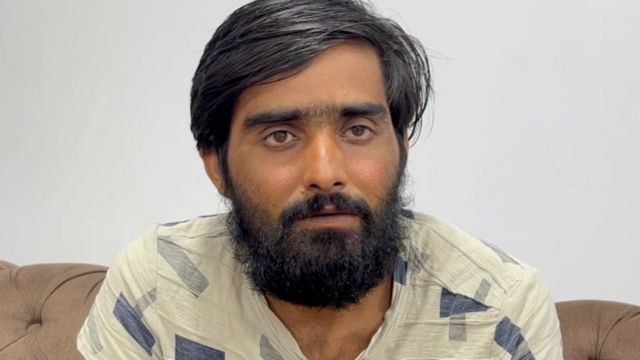- Khaled Karamat
- BBC Urdu – Athens
After the emigrants’ boat sank, Muhammad Hamza had enough to escape certain death
Muhammad Hamza appeared calm and composed, his voice not conveying any feelings or emotions. One would be shocked to know that this 30-year-old could have helped survive.
When smugglers took him to a fishing boat anchored off the Libyan coast, Mohammed made the decision to join the deadly expedition in the blink of an eye.
He was sitting on the deck of the boat and kept his head down.
The United Nations said about 750 people were trapped on the boat.
“Nobody cares about me,” Mohamed told me in the Greek capital, Athens, after being released from a detention center with the rest of the survivors.
He was one of 12 Pakistanis who survived the sinking of the migrant boat out of 104 people rescued. There are conflicting accounts of the sinking of the fishing boat in the Mediterranean Sea in the early hours of June 14 under mysterious circumstances and why it sank.
“There were Egyptians and Syrians with their families on the boat. I was on the middle deck, with many Pakistanis. There were Pakistanis on the lower deck of the boat,” says Mohammad.
He said there were no Pakistani women on the boat and he saw two children aged 10 or 11. About 100 Pakistanis were on board, the rest on the two lower decks.
There is disagreement about the number of Pakistanis on board. Pakistani officials say there were 300 civilians on board, but Mohammad insisted the number was 350. He explained: “When we left the safe haven in Libya, we knew how many Pakistanis there were among us.”
“We don’t know how many Syrians and Egyptians we have with us. We know the number of Pakistanis who were with us. We even know the brokers who arranged their travel.”
The migrant boat was photographed several times before it sank
They beat and forced them to sit
Mohammed spoke of the terrible conditions and harsh treatment he faced during the six nights and five days he spent at sea. “The Egyptians and Libyans beat us and made us sit down.”
“We weren’t allowed to stand. We couldn’t even stretch our legs. They didn’t even let us speak.”
Running out of food and water, the travelers were forced to drink sea water. “There were no toilets, we had to pee in the sea,” he says.
The boat has been continuously circling in a radius of 20-25 km from the Mediterranean Sea for the past two to three days.
He says three ships approached the boat 24 hours before it sank. Two “cargo ships” and a ferry provided food and water to the passengers.
Through ocean surveillance data, the BBC was able to identify two vessels that approached the fishing boat on June 13.
The owners of the two vessels said the Greek coast guard had asked them to provide supplies to the fishing boat passengers.
Migrant boat sinks: BBC obtains evidence that casts doubt on Greek coastguard account
WATCH: Survivors flee to safety after Greek ferry disaster
Crying for help
Mohammed was the only one to get emotional when talking about the events of the last day. “People were screaming for help, some waving their shirts to catch the eyes of passing ships,” he said.
It was getting dark and he couldn’t describe the last ship that approached them.”It was late, so I don’t know what happened.” “The ship had great lights.” “I was sitting in the back of the boat and the ship was in front. People said she (the ship) threw ropes for them.”
“I was sitting on the right side of the boat and it turned to the same side and we jumped out.”
Greek officials say the coast guard tried to attach a rope to the boat more than two hours before it capsized so some of their crew members could board the vessel and assess the situation.
Officials said the people on board tried to untie the rope saying they wanted to go to Italy.
The Greek Coast Guard has denied allegations that they were towing the boat when it sank, or that they accepted any responsibility.
Mohamed says the boat’s engine stopped working half an hour before the boat sank, and people on the two lower decks were allowed to go to the roof in panic.
He notes: “When our boat overturned there were four or five freighters in the area, which surrounded us on all four sides, but were a short distance away and did not come near us, but left a speedboat for us.
“As I was swimming towards him, I saw an empty 1.5 liter bottle. I grabbed it and tried to make my way.
“Ahead of me was a Syrian and an Egyptian holding a small rubber tire. I swam with them for half an hour to 40 minutes. Then the speedboat rescued us.”
Muhammad was unemployed in Pakistan and left his country in search of a better life, he says.
He paid 2.5 million Pakistani rupees ($8,700) for the journey, traveling from Karachi to Dubai and then to Egypt before finally reaching the Libyan city of Benghazi.
Mohammad hopes to live out his life here and says he spoke with his family in Gujranwala, a Punjabi town in Pakistan. They are “happy” that he is alive.

“Creator. Award-winning problem solver. Music evangelist. Incurable introvert.”

